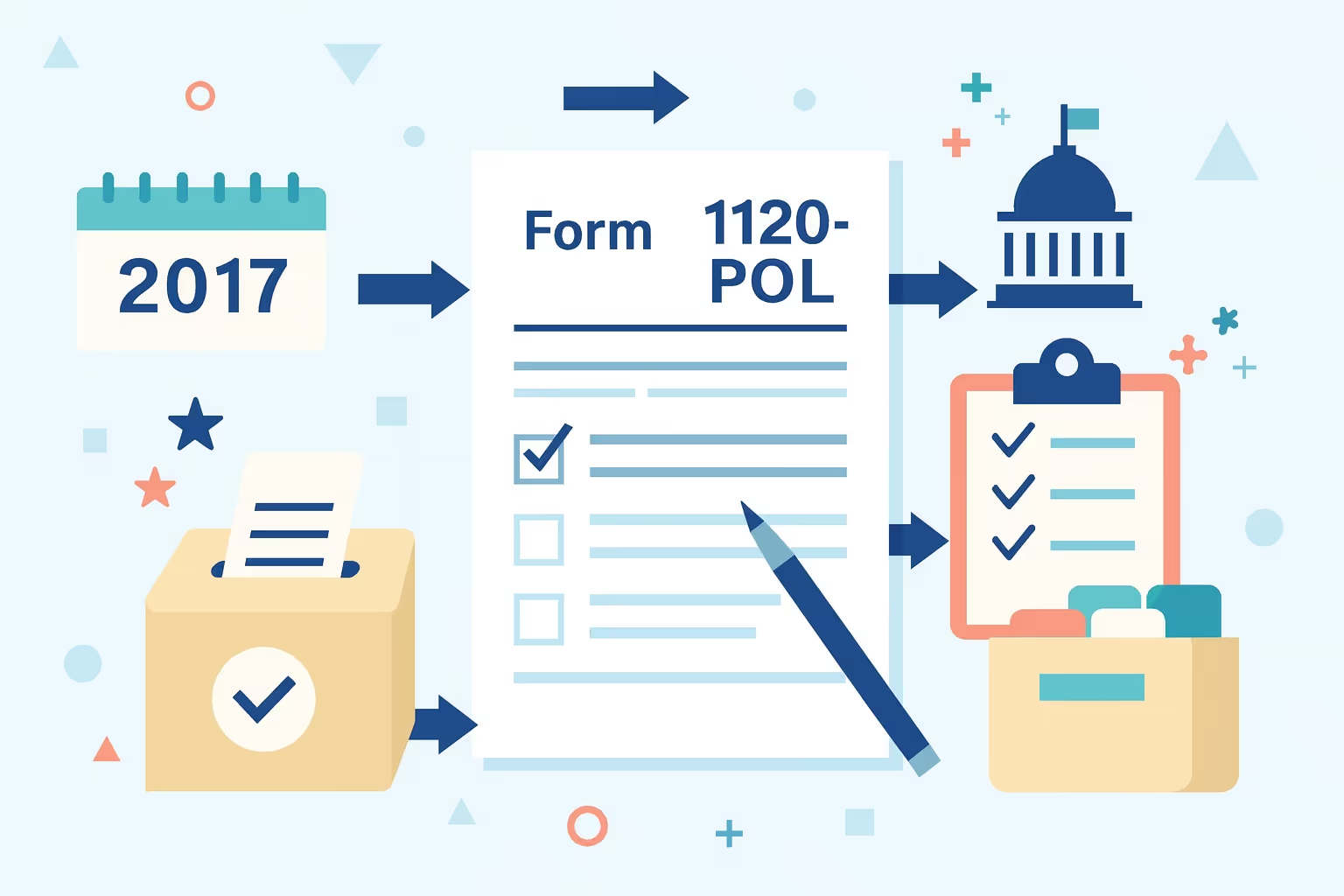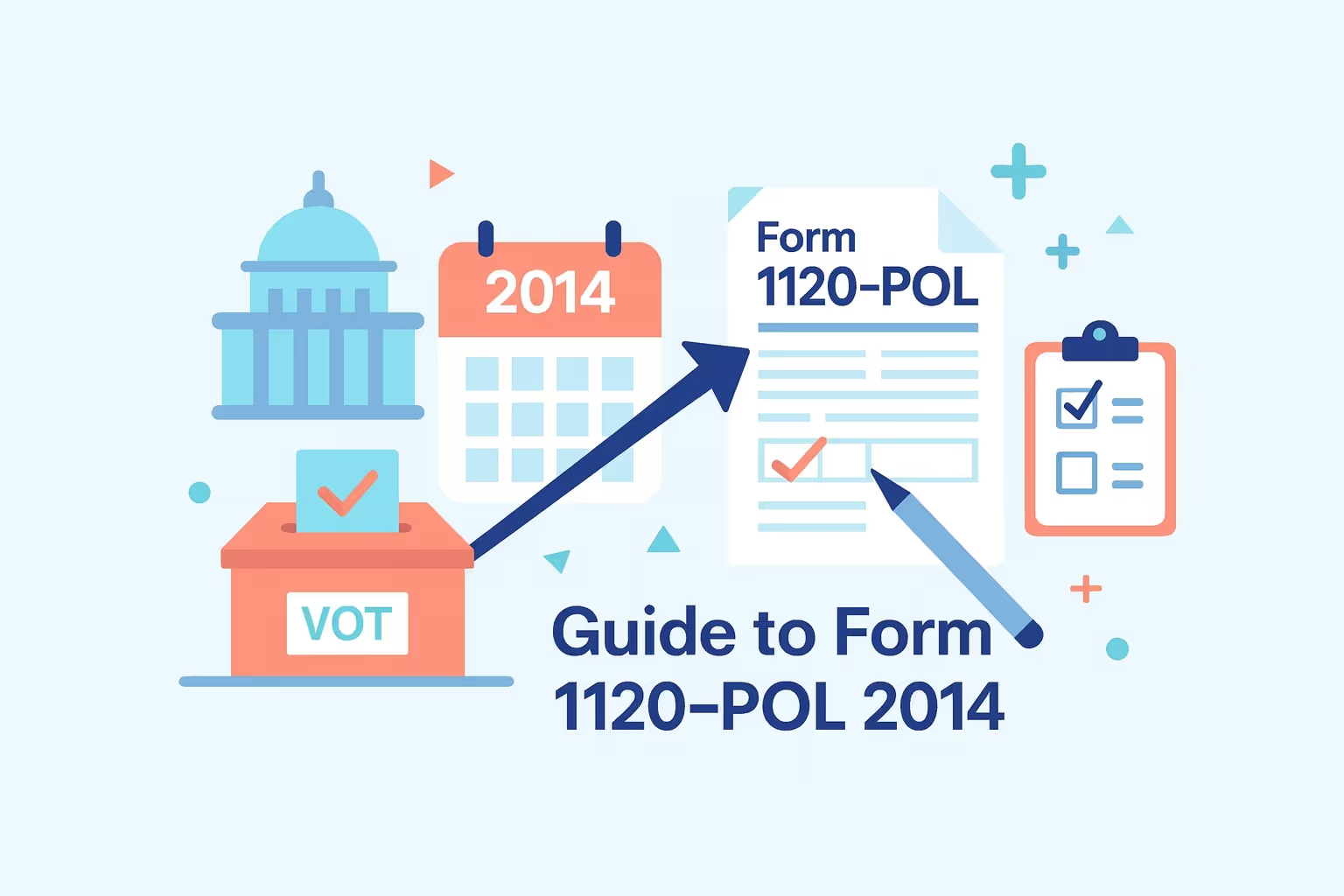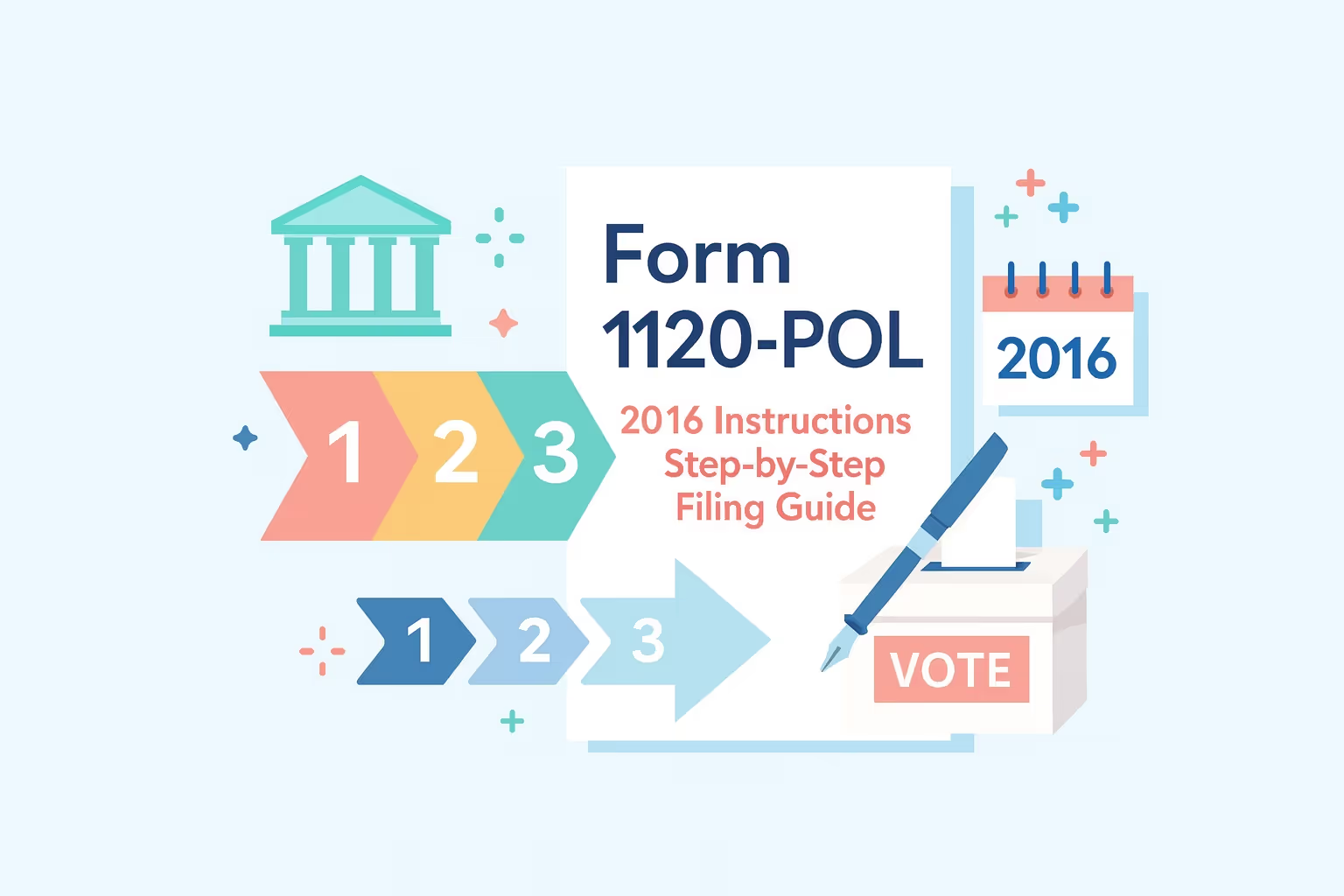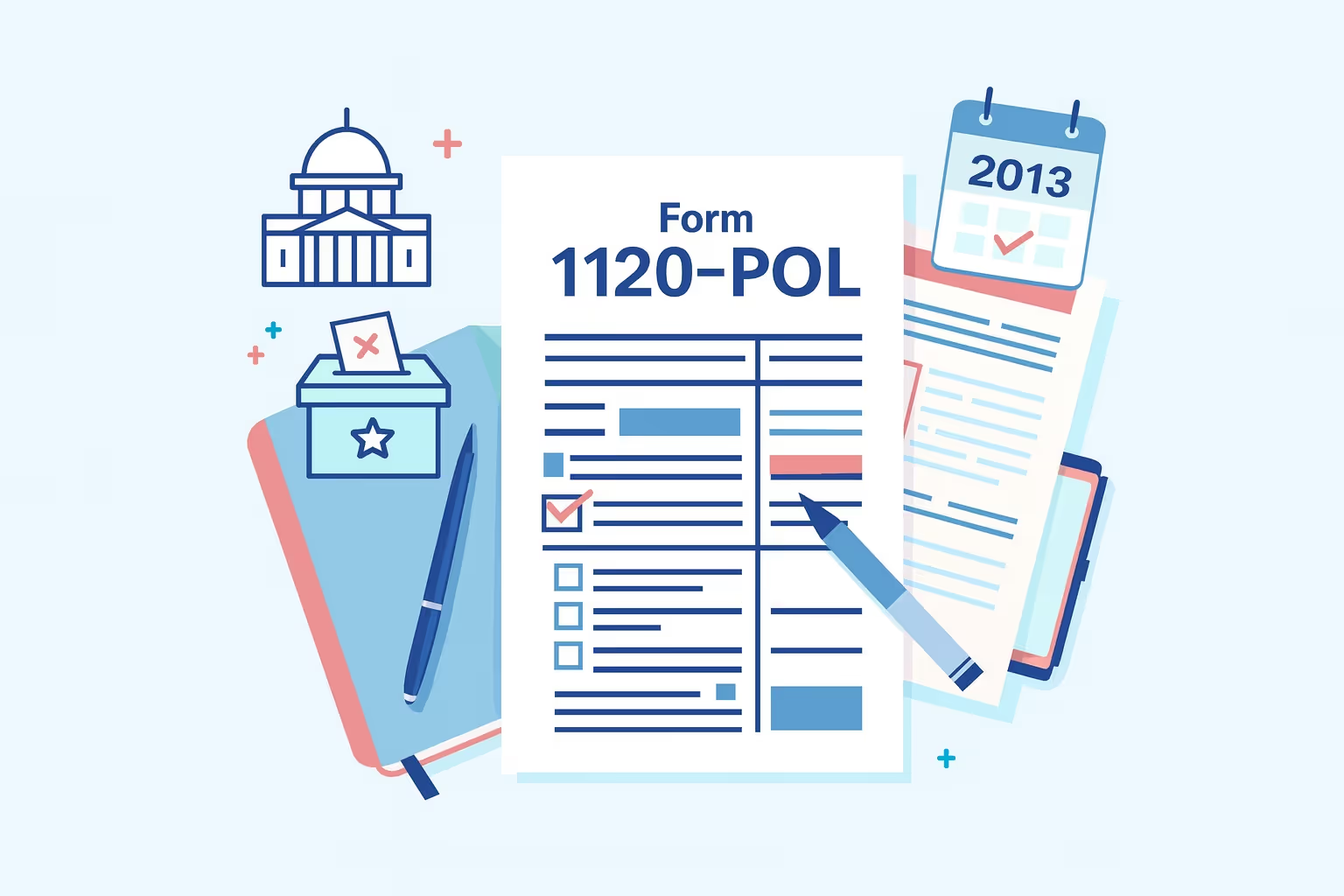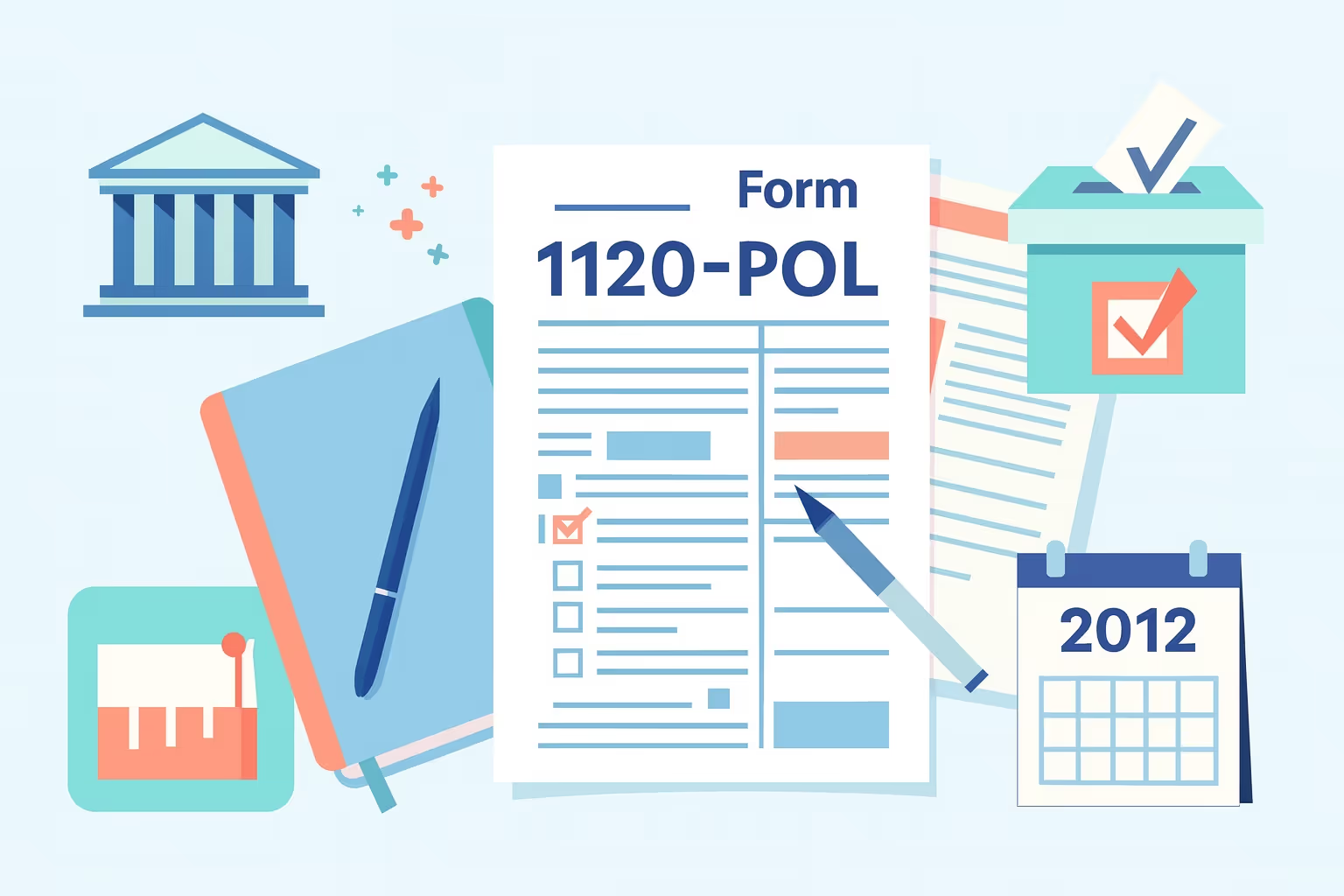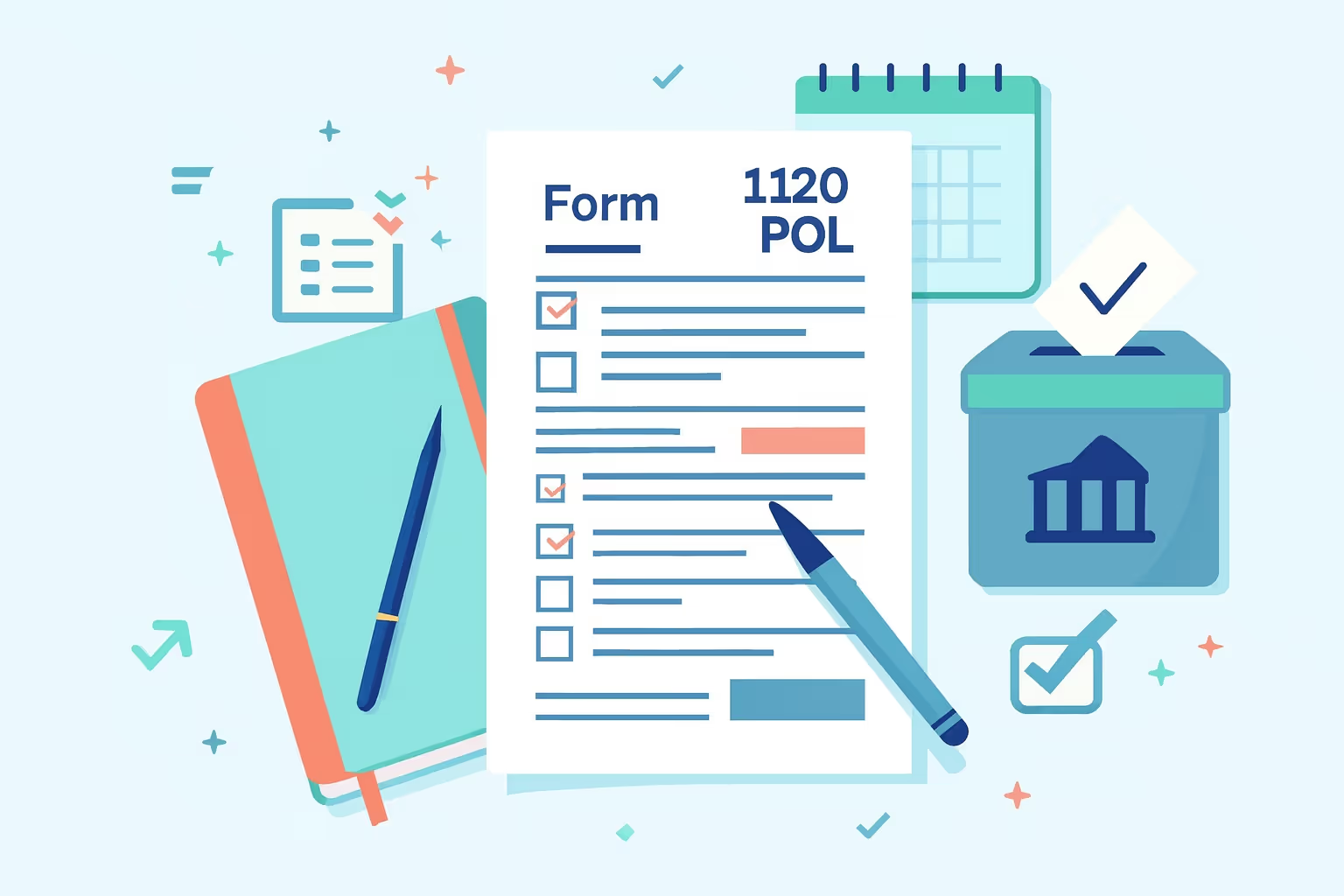
Form 1120-POL is the federal tax return that specific political organizations must file to report taxable income and meet Internal Revenue Service requirements. While the concept of an income tax return may seem complex, the process is manageable when broken into clear steps. This filing applies to organizations that engage in activities intended to influence elections, as well as some exempt organizations that generate taxable income under Section 527. Understanding the purpose of the form and the rules surrounding it is the first step toward accurate reporting.
For the 2010 tax year, organizations were required to follow the specific Form 1120 POL 2010 instructions to remain compliant. These instructions guided taxpayers on how to prepare, calculate, and submit the return. Filing correctly ensures that money earned from investments, interest, dividends, and other sources is properly reported and that deductions and expenditures are handled in accordance with IRS guidelines. By carefully reviewing requirements, organizations can avoid penalties and maintain a good standing.
Many committees, funds, and associations may find the process detailed but not overwhelming when approached with the proper guidance. Gathering financial information, meeting deadlines, and following each filing step reduces errors, helping organizations focus on their core purpose rather than tax problems. Whether working with a tax preparer, consulting tax experts, or using software, the goal is to complete the return accurately and clearly. With the proper support, political organizations can meet their tax obligations and submit their returns on time.
What Is Form 1120-POL?
Form 1120-POL, also known as the U.S. Income Tax Return for Certain Political Organizations, is the required federal tax return for political organizations that earn taxable income. The form ensures that these groups meet IRS obligations while distinguishing between exempt function income and taxable income. It applies to organizations created to influence elections as well as exempt organizations that fall under Section 527 rules.
Who Must File Form 1120-POL?
- A political organization that has any taxable income during the year must file. This includes parties, committees, associations, funds, and other groups organized primarily to influence elections.
- A principal campaign committee for congressional candidates is required to submit the form.
- A newsletter fund maintained by elected officials or candidates must also be filed.
Specific exempt organizations, such as 501(c) groups, that are treated as having political organization taxable income under Section 527(f), must also comply.
Key Definitions
- Political organization taxable income: This is the excess of gross revenue, excluding exempt function income, over deductions directly tied to producing that income.
- Exempt function income refers to contributions, membership dues, and fundraising proceeds that are segregated and used exclusively for election-related purposes.
- Exempt function activities refer to those designed to influence the selection, nomination, election, or appointment of individuals to public office.
Filing Threshold
Any political organization with taxable income must file Form 1120-POL, regardless of the amount. If the taxable income is zero or less, filing is not required, but organizations may choose to file voluntarily. Doing so can help establish the statute of limitations period and demonstrate compliance with IRS requirements.
Form 1120-POL plays a crucial role in the taxation of political organizations, as it clarifies how income, expenditures, and deductions are reported and accounted for. By understanding the filing rules, organizations can minimize errors and ensure the accuracy of their returns.
Updates for the 2010 Tax Year
Form 1120-POL for the 2010 tax year included significant changes that affected political organizations and specific exempt organizations. These updates influenced how taxpayers prepared their federal tax returns and ensured the accuracy of their reporting.
Major Changes in 2010
- Starting January 1, 2011, all federal tax deposits had to be made electronically through the Electronic Federal Tax Payment System (EFTPS). Paper coupons such as Forms 8109 and 8109-B could no longer be used after December 31, 2010.
- The threshold for filing Form 990-N, also known as the e-postcard, increased from $25,000 to $50,000 in annual gross receipts. This change simplified tax filing for smaller organizations.
Deadlines for 2010
- The due date for filing Form 1120-POL for the 2010 tax year was March 15, 2011.
- Organizations could extend the deadline to September 15, 2011, by filing Form 7004.
- If the due date fell on a weekend or legal holiday, the IRS allowed submission on the next business day.
Continuing Requirements from Previous Years
- Electronic filing remained required for Forms 8871 and 8872.
- The procedures for principal campaign committee designations remain unchanged.
- The tax rate structure for political organizations remained in effect, featuring both flat and graduated rates, depending on the type of committee.
These updates reflect the IRS's efforts to modernize tax collection processes and align filing requirements with an organization's size and activity.
Step-by-Step Filing Instructions
Filing Form 1120-POL is easier when broken into clear steps. Each step represents a section of the form that political organizations or exempt organizations must complete to meet IRS requirements.
Step 1: Prepare Before Filing.
Before beginning the form, an organization should:
- Confirm its Employer Identification Number (EIN).
- Gather financial information for the tax year, including receipts, expenditures, interest, and dividends.
- Verify that required forms such as 8871 and 8872 were filed if applicable.
- Determine whether it qualifies as a principal campaign committee.
- Collect all supporting schedules and attachments that may be needed.
Step 2: Complete the Header Section.
The top of Form 1120-POL requires the organization’s full legal name, EIN, and mailing address. It also includes checkboxes for changes such as amended returns, address changes, or final returns. Principal campaign committees must determine whether they are the only political committee for a candidate and include the candidate's details if required.
Step 3: Report Income (Lines 1–8).
Organizations must list all taxable income sources, including:
- Dividends from investments
- Interest from bank accounts, securities, or loans
- Rental income before expenses
- Royalties received
- Capital gains using Schedule D
- Gains or losses from the sale of business property using Form 4797
- Other income, such as improperly segregated contributions or business activity income.
Step 4: Calculate Deductions (Lines 9–16).
Deductions must be directly related to generating taxable income. Allowable deductions include:
- Salaries and wages may be deducted if they are connected with taxable income activities.
- Repairs and maintenance are deductible when they keep the property in usable condition.
- Rents paid for property used in income-producing activities can be deducted.
- State and local taxes, as well as business licenses, are allowable deductions.
- Interest may be deducted if the loan is connected to income-producing activities.
- Depreciation is deducted using Form 4562.
- Other deductions include office supplies, utilities, travel expenses, and professional fees, provided they relate to taxable income.
Step 5: Determine Taxable Income (Lines 17–19).
Taxable income is determined by subtracting deductions from pay. For Section 501(c) organizations, the calculation is based on the smaller of net investment income or exempt function expenditures. Most organizations may also claim a $100 specific deduction, unless they are filing as a newsletter fund.
Step 6: Compute Tax Liability (Lines 20–22).
- Non-principal campaign committees apply a flat 35 percent rate to taxable income.
- Principal campaign committees use graduated corporate tax rates.
- Credits, such as the foreign tax credit or fuel credit, may reduce the total tax owed.
Step 7: Record Payments and Balance Due (Lines 23–25).
This section accounts for taxes already paid, credits claimed, and any balance owed or overpayment. Payments made with an extension, credits from other forms, and total deposits are entered here. If the total tax exceeds the costs, the organization must pay the difference. If payments exceed the tax liability, the organization may be eligible to claim a refund.
Following each step carefully ensures accuracy and helps organizations meet their federal tax return obligations. Proper preparation and attention to IRS requirements also reduce the chance of penalties and errors.
Filing Process and Deadlines
The process of submitting Form 1120-POL requires understanding where and how to file, as well as meeting IRS deadlines.
Where to File?
- For organizations located in the United States, returns were mailed to the IRS Service Center in Ogden, Utah.
- For organizations with a principal office in foreign countries or U.S. possessions, returns were mailed to a designated P.O. Box in Ogden, Utah.
- The IRS also accepted filings through private delivery services such as FedEx, UPS, and DHL, provided the organization obtained proof of mailing.
Filing Deadlines for 2010
- The due date was March 15, 2011, which represented the 15th day of the third month following the end of the tax year.
- Organizations seeking more time could file Form 7004 for an automatic six-month extension until September 15, 2011.
- If the deadline fell on a weekend or holiday, the return was due on the following business day.
Electronic Filing Limitations
In 2010, Form 1120-POL was not available for electronic filing. Paper submission remained the only option, although related forms, such as Form 8871 and Form 8872, had to be filed electronically.
Filing on time helps organizations avoid penalties and ensures compliance with federal taxes. Meeting the deadlines and following the submission process correctly also provides accuracy and accountability in the reporting of income and expenditures.
Payment Instructions
Organizations paying taxes for the 2010 tax year had specific options. Before January 1, 2011, payments could be made using Federal Tax Deposit Coupons. After that date, all costs had to be made electronically through the Electronic Federal Tax Payment System (EFTPS).
Accepted Payment Methods in 2010
- Federal Tax Deposit Coupons (Forms 8109/8109-B) were allowed until December 31, 2010.
- EFTPS became the standard method starting January 1, 2011.
EFTPS Enrollment and Setup
To use EFTPS, an organization needed to:
- Enroll online at www.eftps.gov or by calling the EFTPS helpline.
- Provide an Employer Identification Number and bank account details.
- Wait for a Personal Identification Number (PIN), which usually arrives in 7–10 business days.
Payment Deadlines and Penalties
Payments had to be initiated by 8 p.m. Eastern Time the day before the due date. Late payments resulted in penalties of 0.5 percent per month, up to 25 percent of the unpaid tax. Interest was also charged on overdue balances.
Paying through EFTPS ensured compliance with IRS rules and provided immediate confirmation of payment.
Required Schedules and Attachments
Specific schedules and forms must be included with Form 1120-POL to complete the federal tax return. These attachments supply details for income, deductions, and credits.
Mandatory Forms
- Schedule D is required for reporting capital gains and losses.
- Form 4797 must be used if the organization sells business property.
- Form 4562 is needed to report depreciation and amortization.
- Form 4136 is required when claiming fuel tax credits.
Supporting Schedules
Organizations must prepare additional schedules, including:
- A dividend schedule that lists each payer and the amounts received.
- An itemized deduction schedule that breaks down other deductions.
- An income schedule for any other taxable income not directly shown on the form.
Document Assembly
The IRS requires attachments to be filed in a specific order. The primary return comes first, followed by credits, schedules, and other supporting statements. Each attachment should include the organization’s name and EIN.
Organizing these attachments correctly helps avoid processing delays and ensures a complete return.
Common Mistakes to Avoid
Errors in filing Form 1120-POL can lead to penalties or unnecessary IRS review. Awareness of common mistakes helps organizations improve accuracy.
Reporting Errors
- Some taxpayers incorrectly include exempt function income as taxable income.
- Others fail to report dividends, interest, or rental income.
- Business income is sometimes misclassified as exempt function income.
Deduction Errors
- Campaign and political advertising costs are not deductible.
- Some filers claim general overhead expenses without proper allocation.
- Many organizations forget the $100 specific deduction.
Calculation and Filing Errors
- Incorrect tax rates are sometimes applied to principal campaign committees.
- Payments are occasionally included with the paper return, rather than being submitted electronically.
- Some organizations fail to attach required schedules or related forms.
Avoiding these errors ensures accuracy, protects compliance, and helps organizations avoid unnecessary penalties or delinquency.
Special Filing Situations
Some political organizations may face unique circumstances when filing Form 1120-POL. These include dormant years or first-time filings.
Zero Activity or Dormant Year
An organization that earns no taxable income in a given year is not required to file. However, filing voluntarily can start the statute of limitations period and demonstrate compliance.
- If there is no taxable income, all income lines should show zero.
- Expenses should still be reported, even if they occurred without any income.
- The $100 specific deduction is not allowed if there is no taxable income.
Maintaining accurate records during dormant years is still important. Organizations should keep bank statements, note the lack of activity, and update any address or officer information with the IRS.
First-Time Filers
Organizations filing Form 1120-POL for the first time must ensure they are correctly set up and compliant.
- Obtain an Employer Identification Number before filing.
- File Form 8871 within 24 hours of formation.
- File Form 8872 reports for contributions and expenditures if required.
- Keep exempt function income separate from taxable income.
First-time filers should also establish reliable accounting systems. Proper recordkeeping helps organizations allocate expenses correctly and prepare accurate future returns. Understanding these special filing situations helps organizations avoid confusion and meet IRS expectations.
Frequently Asked Questions
Who must file Form 1120-POL for the 2010 tax year?
Form 1120-POL 2010 instructions apply to political organizations and specifically exempt organizations that have taxable income. Any committee, association, or fund organized to influence an election must file a federal tax return if it reports income such as dividends, interest, or rents. The IRS requires taxpayers to complete the income tax return even when only a small amount of money or receipts qualify as taxable.
Is Form 1120-POL the same as a regular federal tax return?
Form 1120-POL differs from the standard income tax return that most taxpayers or trusts typically submit. It is a federal tax return designed explicitly for political organizations and other organizations subject to Section 527 taxation. While regular returns cover wages or mortgage interest, this form focuses on contributions, expenditures, and other income sources related to the organization’s exempt function. Each filing must follow IRS rules and include the correct forms and schedules.
What deductions can a political organization claim?
Deductions are limited to expenses directly connected to producing taxable income. Allowable deductions may include office rent, supplies, or interest on loans. Campaign advertising or prohibited expenditures tied to exempt function activities are not deductible. Organizations should prepare accurate schedules to support deductions. Working with a tax preparer or tax expert ensures accuracy so taxpayers do not owe more in federal taxes than required.
Can Form 1120-POL be filed electronically in 2010?
For the 2010 tax year, the IRS required paper filing of Form 1120-POL. Organizations had to mail the return to the proper address or submit it through approved delivery services. While some forms, such as 8871 and 8872, required electronic filing, Form 1120-POL itself could not be e-filed. Taxpayers should carefully note the filing date and seek expert help if they need guidance with the submission process.
What happens if a political organization files late?
If an organization does not meet the filing date, the IRS may assess penalties and interest. Taxpayers may owe money equal to 5 percent of unpaid taxes for each month the return is late, up to a maximum of 25 percent of the total tax amount. Filing late also delays any refund due to the organization. A tax preparer or software reviewed by tax experts can help estimate amounts owed, prepare accurate tax returns, and ensure compliance with federal tax laws.
How can organizations avoid errors in Form 1120-POL?
Accuracy is critical when taxpayers prepare and submit Form 1120-POL. Errors often occur when contributions or exempt function income are reported as taxable income. Organizations should maintain detailed records, including receipts and financial information. Each return should be reviewed for accuracy before filing. Seeking expert help, using reliable software, or scheduling an appointment with a tax preparer helps political organizations complete the process correctly and maximize refund opportunities while meeting IRS requirements.











